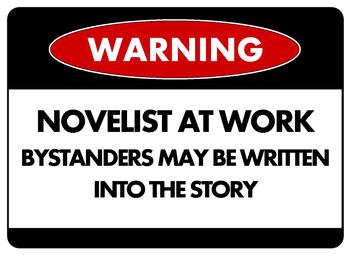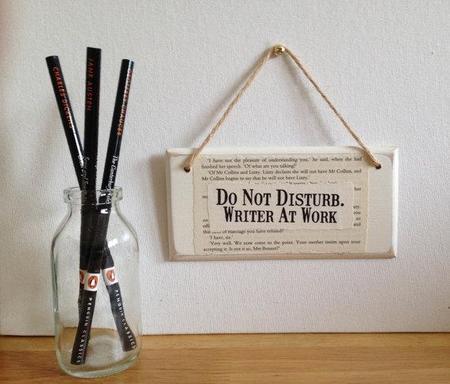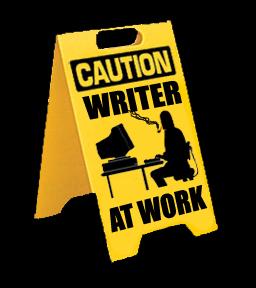Things Your Writing Teacher Never Told You: Location, Location, Location! or How to Find and Maintain Your Writing Space
 In a perfect world, we could all write anywhere, anytime. But even seasoned writers sometimes have problems sitting down and starting a writing session or staying in a writing session once it’s started. While we all have these problems – the pros find ways to get past it. Here are some suggestions on how to fight the urge to do absolutely anything but write. The causes are too numerous to deal with in a single blog post, but lets start with some basics.
In a perfect world, we could all write anywhere, anytime. But even seasoned writers sometimes have problems sitting down and starting a writing session or staying in a writing session once it’s started. While we all have these problems – the pros find ways to get past it. Here are some suggestions on how to fight the urge to do absolutely anything but write. The causes are too numerous to deal with in a single blog post, but lets start with some basics.
Location of Your Workspace
Don’t try to work in the line of fire. Don’t place your workspace near the TV or PlayStation. Even if you’re not tempted to watch or play (And aren’t we all?), almost no one can write when there’s that much background noise. Don’t fight the battle of “I ought to be able to work anywhere.” Save that mental sword arm for your plot and prose.
Wherever your family most often gathers, whether it’s the den or the kitchen, is the worst possible place for you to try to write. For most, writing requires a measure of silence and solitude, and time away from distractions.
The amount of silence, and the type, vary from writer to writer. You’ll have to experiment to see what works best for you. I often write to music. Others find the white noise and anonymity of cafes creates a protective bubble they can concentrate in – so long as you’re not sitting with a companion who keeps asking if they can interrupt for just a moment.
While your bedroom may be the quietest room in the house, it isn’t a great choice for your workspace. Your mind attaches messages to rooms. You may be hit with an overwhelming urge to nap every time you sit down to write. If you persist and do all your writing in your bedroom, down the road you may find you don’t sleep in there as well as you used to, because every time you lay down to sleep your mind starts working on the latest plot problem in your novel.
Many authors find it easiest to write is when everyone else is asleep. That may not work well if your spouse is snoring nearby, or tossing and turning and grumbling about when you’re going to turn out the light. But hey, the kitchen is probably empty at that point. You may have to negotiate how to stagger your sleep sessions with other family members’ schedules, if you write until the wee hours and then turn in for eight hours of sleep.
 Turning the spare bedroom into your private office is ideal, but not always an option. So, think outside the box. A desk in one corner of the kitchen – so long as it’s facing away from the dirty dishes in the sink – can work well, if the kitchen is not the family’s primary gathering place.
Turning the spare bedroom into your private office is ideal, but not always an option. So, think outside the box. A desk in one corner of the kitchen – so long as it’s facing away from the dirty dishes in the sink – can work well, if the kitchen is not the family’s primary gathering place.
I’ve known writers who have set up shop in an empty closet; some left the door on, some took it off. You can convert the pantry or a corner of the laundry room into a workspace, if the sound of the washing machine doesn’t bother you.
If no other option presents itself, you can take a tray table, a folding chair, and your laptop and sit in the back stairwell of your apartment building. Almost no one uses the backstairs, so you won’t have to worry about moving every time someone walks by.
I’ve heard of writers co-opting the second bathroom as their writing space. I’ve been known to write in the tub when body pains prevented me from spending any more time in my office chair – there are some terrific sturdy bathtub caddies that will support a notebook or manuscript pages. For safety reasons, I don’t recommend using your laptop or tablet in this situation. Accidents can happen, and you’re looking to finish your story, not die a mythic writer’s death. However, if you opt for tub-writing, and there’s more than one person at home, make sure you’ve staked out the second bathroom, otherwise, you’re destined for frequent interruptions.
No matter what room you set up in, if it’s not a dedicated office, you may find yourself distracted by the other functions of the room. Outside the bedroom, that’s often caused by visual distractions: dirty dishes, unfolded laundry, and the like. Some writers can put on proverbial blinders, and simply not see these things. But if you’re repeatedly getting distracted by these visual reminders of your To-Do list, you can buy a privacy screen, or make one yourself, to create your own private corner. You can even hang a sheet or curtain from a spring rod. The idea is to simply block your line of sight from disruptive stimuli.
 Ideally, your workspace will be a dedicated area where you can spread out papers, a dictionary, reference, and research materials without having to gather them up at the end of each session. But if that’s not possible, at least try to stake out a corner where you can leave things out ready and waiting for your next session, without helpful hands moving them.
Ideally, your workspace will be a dedicated area where you can spread out papers, a dictionary, reference, and research materials without having to gather them up at the end of each session. But if that’s not possible, at least try to stake out a corner where you can leave things out ready and waiting for your next session, without helpful hands moving them.
Don’t Answer the Phone, Look at Emails, or Check Social Media
No matter how short you intend to keep the call or social media check in, any of these things are going to break you out of your writing session and switch your brain from your plot to real world events. Newer writers, especially, may have difficulty switching back into writing mode. Many pros have a strict “no internet or phone until my writing session is over” rule, because they know it can take up precious writing time trying to get back into the swing of the story.
If you’re working at home, it’s best to leave the cell phone in a distant room and the browser windows for social media closed. In public, you can mute your phone. The various beeps, dings, and chimes indicating new messages or content can be every bit as disruptive as looking at what they say.
Do Not Disturb
Wherever you set up shop, establish some hard and fast family rules and enforce them, if you’re only available writing time is when other family members are around.
I recommend “Don’t interrupt me unless it’s an emergency.” You’ll need to be very explicit with kids, especially, what constitutes an emergency, because anything can be construed as one, if waiting for you to finish writing seems inconvenient.
I would suggest emergency be defined as:
“There’s a fire in the house.”
“Someone needs to go to the hospital right now.”
“A family member or very close friend has just died.”
The following are just a few things that are not acceptable emergencies:
“What’s for dinner?”
“When are you going to be done?”
and
“Your mother’s on the phone.”
Leave firm instructions that any messages a family member takes on your behalf should not be delivered until you’re done writing, unless it is an emergency as defined by above. All other news can wait.
Callers will have to be trained, too. Your mother or your best friend may be peeved at first, when you don’t take their call. And it’s tough on a kid answering the phone when grandma says, “Nonsense. She doesn’t mean me.” If your kids will be answering the phone, make sure you brief all the adults who are likely to call about your No Phone Messages While I’m Writing rules. It will take some training to get everybody on board, and there may be some bruised feelings at first, but when you hand them a copy of your first published story, or an autographed copy of your first (or next) published novel, they’ll realize it was worth it.
You’ll have to repeat the rules often, especially in the beginning when you set them up. Everybody has a tendency to think rules, no matter what they are, don’t apply to them or their situation. And be firm about enforcing them. If you allow a lot of exceptions in the beginning, you’ll have set a bad pattern that will be hard to break.
 Try to keep your patience as you repeat the “Do Not Disturb” rules for the hundredth time. If you get angry, and the issue turns into a reoccurring fight, it will lead to resentment on everyone’s part every time you sit down to write. It’s hard to write well when you’re angry, unless you’re writing a fight scene, and a story can only handle so many of those. Worse, it can become a hot button family members will be tempted to push whenever they’re upset with you. (Writing schedules have become the hot-button issue in numerous marriages when one spouse is a writer and the other isn’t.)
Try to keep your patience as you repeat the “Do Not Disturb” rules for the hundredth time. If you get angry, and the issue turns into a reoccurring fight, it will lead to resentment on everyone’s part every time you sit down to write. It’s hard to write well when you’re angry, unless you’re writing a fight scene, and a story can only handle so many of those. Worse, it can become a hot button family members will be tempted to push whenever they’re upset with you. (Writing schedules have become the hot-button issue in numerous marriages when one spouse is a writer and the other isn’t.)
There are some very clever Do Not Disturb – Writer At Work signs available, which will help remind them with a dose of humor. Threats on the signs include “Death of Your Favorite Character” and “Bystanders May Be Written Into the Story.”
It may help to get everyone on board with the “Do Not Disturb” rules, if you agree to a scheduled writing time, or a set length of time for any given work session. The negotiating and bargaining is worth it. You want your family to be on Team-Writer not opposing you or resenting your writing.
It may also be effective, in the early days of trying to establish the pattern, to bribe them. Prepare some snacks, rent or let them download a movie they’ll like, leave a note saying they can order pizza for dinner. Family members are much more likely to keep their end of the bargain if they get rewarded for it. You can’t give these sorts of rewards day in and day out, (though I recommend an abundance of healthy snacks be in the fridge at all times). But it will help if such rewards can be done on a somewhat regular basis. You want your family to realize that everyone wins when you get to write.
Another way to create a vested interest for the family is to buy a family reward (that you too will enjoy!) with your publishing paychecks; a trip to the movies or a baseball game if you sold a short story. With novel advances, you can splurge a little bigger.
 If possible and appropriate, enlist the family’s aid in the writing project. As students, your kids may make excellent research assistants, and every family vacation can be turned into a quirky and fun expedition that will give your fodder for your writing.
If possible and appropriate, enlist the family’s aid in the writing project. As students, your kids may make excellent research assistants, and every family vacation can be turned into a quirky and fun expedition that will give your fodder for your writing.
Clutter
Even if you work in a dedicated office, and so, do not see the dishes in the sink or the laundry waiting to be done, situate your actual work space so all clutter is out of view. There can be stacks of papers four feet high in rows behind you (hopefully braced so they don’t fall over at the wrong moment), just so long as you can’t see them. If they’re in front of you, or in your peripheral vision, you’re likely to be distracted by all the To-Do’s in that stack. That’s one of the reasons my desk is situated directly in front of the window in my office. The view isn’t great — just some buildings and an alley — but I can’t see the stack of files and paperwork that needs to be dealt with, or the items sitting out for other projects. The desk and bookshelf within my peripheral vision are neat. It makes for a serene writing space.
Ambiance
Writing comes easiest if you’re in a playful state of mind, rather than in an administrative, care-giver or chores mode. One way to get there is through the ambiance of your workspace. All other work should be physically out of sight, but what should be in front of you? Fun stuff. Nearly every writer I know has at least a couple toys and figurines sitting on their desk or computer.
I have the luxury of a dedicated office. I’ve painted the walls lavender and covered them with Mardi Gras masks, Voodoo dolls, and Halloween art. My bookshelves feature a variety of figurines and fantasy-themed plush toys. A stuffed dragon, a frog in a swing, and a sorcerer staring at a quarter moon through a curving telescope hang from my ceiling. When I’m stuck and getting frustrated in my writing, I can swivel around and see all the fun stuff. This helps me slip back into play mode, back into “Let’s Play Pretend” mode. I write better stuff when I’m in a playful frame of mind.
 I change things out in my office every now and then. A gargoyle tapestry once hung on a wall, until I bought another bookshelf for my ever-growing reference book collection. At one point, neon-colored beads hung across the doorway, and a comfortable rocker sat next to a bookshelf. Now Mardi Gras beads hang from my ceiling fan/light fixture, and a Mardi Gras sequined jester’s hat is on my wall.
I change things out in my office every now and then. A gargoyle tapestry once hung on a wall, until I bought another bookshelf for my ever-growing reference book collection. At one point, neon-colored beads hung across the doorway, and a comfortable rocker sat next to a bookshelf. Now Mardi Gras beads hang from my ceiling fan/light fixture, and a Mardi Gras sequined jester’s hat is on my wall.
But the filing cabinet is always tucked away, either behind a bookshelf or on the wall behind me, where it can be accessed, but not easily seen.
In short, my writing space is a silly place, and I find my mind shifting into a playful mood conducive to playing make-believe as soon as I step through the door.
I’ll talk about some tricks and tips to writing in public places in another blog. For now, share in the comments section below what’s worked, and what hasn’t, when you write at home. Also, feel free to share pix of your writing space.
Meanwhile, you can check out my other blogs:
Seven Common Approaches to Stories That Use Mythology, Fairy Tales & Other Established Source Material
No TV for You (when it comes to publicizing your book)
Peer-Pressure Writing: Offering Encouragement & Just a Little Shame
A Story Analysis Worksheet
Tricks for Writing in Public
Location, Location, Location! or How to Find and Maintain Your Writing Space
What Should You Put In a Cover Letter?
Ignore the Market Guidelines at Your Peril – How (Not) to Build a Career
Tina L. Jens has been teaching varying combinations of Exploring Fantasy Genre Writing, Fantasy Writing Workshop, and Advanced Fantasy Writing Workshop at Columbia College-Chicago since 2007. The first of her 75 or so published fantasy and horror short stories was released in 1994. She has had dozens of newspaper articles published, a few poems, a comic, and had a short comedic play produced in Alabama and another chosen for a table reading by Dandelion Theatre in Chicago. Her novel, The Blues Ain’t Nothin’: Tales of the Lonesome Blues Pub, won Best Novel from the National Federation of Press Women, and was a final nominee for Best First Novel for the Bram Stoker and International Horror Guild awards.
She was the senior producer of a weekly fiction reading series, Twilight Tales, for 15 years, and was the editor/publisher of the Twilight Tales small press, overseeing 26 anthologies and collections. She co-chaired a World Fantasy Convention, a World Horror Convention, and served for two years as the Chairman of the Board for the Horror Writers Assoc. Along with teaching, writing, and blogging, she also supervises a revolving crew of interns who help her run the monthly, multi-genre, reading series Gumbo Fiction Salon in Chicago. You can find more of her musings on writing, social justice, politics, and feminism on Facebook @ Tina Jens. Be sure to drop her a PM and tell her you saw her Black Gate blog.

[…] Last week, I talked about how to find the right space at home for writing. As a part of that, I touched on the fact that, sometimes, the primary purpose of a room can interfere subconsciously with your writing efforts. […]